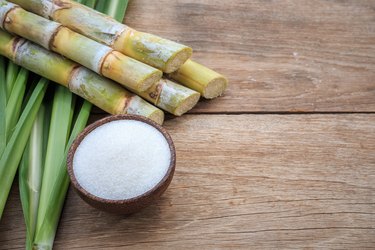
Sugarcane juice's disadvantages stem from the fact that most of the products on the market contain added sugar. Side effects include higher risks of obesity, diabetes, dental cavities and heart disease.
Tip
Pure sugarcane juice may have health benefits, but processed, refined sugarcane juice products with added sugar have adverse effects on weight, blood sugar control and heart health.
Video of the Day
Sugarcane Health Benefits
Sugarcane, Saccharum officinarum, is cultivated to make table sugar, brown sugar and molasses. Its juice is derived from grinding of the stalks of the sugarcane plant.
Sugarcane juice is 70 to 75 percent water, 13 to 15 percent sucrose, and 10 to 15 percent fiber. It also contains antioxidants and other beneficial components called policosanols, notes a June 2015 study published in Pharmacognosy Review.
Video of the Day
Read More: The Nutrition of Sugarcane Juice.
The juice is prized for its healing properties in various parts of the world. Ancient cultures used it as a tonic, a laxative and an aphrodisiac. It was widely believed that the juice could improve kidney function and alleviate jaundice.
According to the Pharmacognosy Review study, some of these traditional uses have been supported by modern scientific research. Research suggests that sugarcane has anti-inflammatory, diuretic and pain-relieving properties, along with blood-sugar regulating and liver-protecting effects.
It should be noted that there's a world of difference between the unrefined sugarcane juice, which contains fiber and healthful compounds, and refined table sugar, which is devoid of any nutrients.
Sugarcane Juice Disadvantages
If you want to try sugarcane juice, read the labels on products to see what they contain. Some products have a small amount of sugarcane juice mixed with water and added sugar, but no fiber. Unless a product is composed solely of unrefined sugarcane juice, it has added sugar, which is linked to a formidable array of adverse health effects.
Foods and beverages with sugar are more calorie-dense, which contributes to obesity, according to the Mayo Clinic. All forms of sugar allow bacteria to multiply in the mouth, which elevates the incidence of cavities. Other side effects include a increased risk of diabetes and fatty liver disease, notes Harvard Health.
Ingesting excessive amounts of sugar raises triglyceride levels, an effect that increases the risk of heart disease, states the Mayo Clinic. Sugar is also linked to higher levels of blood pressure and inflammation, both of which play a role in heart health, adds Harvard Health.
Read More: The Effects of Refined Sugar on the Body
If you're interested in eating sugarcane, you can find it in the produce section of your grocery store. However, a higher rate of dental cavities has been linked to the habit of chewing this delicious food.
How Much Sugar is Acceptable?
The American Heart Association suggests limiting daily sugar intake to no more than 9 teaspoons for men, and 6 teaspoons for women. What does this look like in the diet? Well, one can of soda contains 8 teaspoons of sugar.
Manufacturers add sugar to a whole host of foods, but because sugar has different names, it isn't always easy to gauge how much you're eating. When checking labels, the following terms indicate the product has added sugar: high-fructose corn syrup, corn sweetener, fruit juice concentrate, malt sugar and invert sugar, according to Harvard Health. In addition, look for ingredients ending with "ose" such as glucose, sucrose and maltose.
When keeping track of your sugar intake, watch how much you add to beverages like tea and coffee. Instead of candy and pastries, choose nutrient-dense snacks such as cheese, vegetables and whole-grain crackers. When drinking juice, look for 100 percent fruit juice, or satisfy your sweet tooth by just eating a piece of fruit, the Mayo Clinic advises.
Was this article helpful?
150 Characters Max
0/150
Thank you for sharing!
Thank you for your feedback!